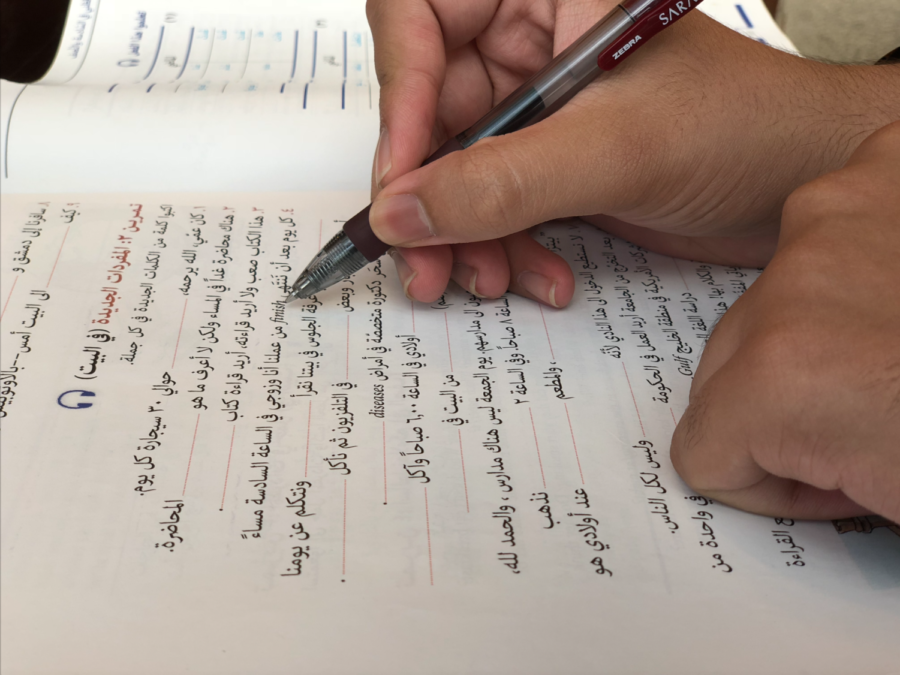EC Cross-Registration Policy Disrupts Students’ Language Learning
After devouring a tasty meal at a restaurant near Gate 3 of Education City, Northwestern University in Qatar freshman Bishal Sharma was in a hurry to find a restroom. Unsure about where the restroom was, he turned to some people loitering around to ask about its location but realized his effort was futile because of the language barrier between them. While Sharma has already achieved fluency in Nepali, Hindi and English, this incident made the NU-Q freshman eager to learn Arabic given its wide usage in Qatar.
“If you are living in this country [Qatar], you need to be able to speak the language of this country. Otherwise, it becomes really hard to communicate with people,” Sharma said.
Despite his strong interest in taking language courses in EC, Sharma was told by his friends that most of the classes suitable for his proficiency level were offered by other universities and therefore required cross-registration. However, the Qatar Foundation cross-registration policy prohibits freshmen from enrolling in classes outside of their universities. Consequently, his hope to advance his language learning was dampened.
Cross-registration enables students to pursue joint minors and certificates as well as to create a “customized learning experience” by taking classes at different branch campuses, according to Qatar Foundation’s website. With universities like Georgetown University in Qatar and Carnegie Mellon University in Qatar offering a variety of language courses, including Arabic, French and Spanish, cross-registration also allows upperclassmen students the opportunity to learn a new language, which many students argue is beneficial to their personal development and cross-cultural understanding.
Recent studies showed that in a globalized world, those who speak multiple languages — particularly Spanish, Mandarin or Arabic — have a much better chance of getting employed. In the United States, the number of job postings targeted at bilingual workers increased from 240,000 to 630,000 between 2010 and 2015. According to the New American Economy, multilingual graduates have a competitive edge over others as the demand for workers who can communicate in more than one language in the US continues to rise.
Yet, cross-university registration is currently available only for upperclassmen undergraduates — specifically, those who have successfully completed their first year — as well as Academic Bridge Program students. The cross-registration policy applies to all EC campus universities, said Hariclea Zengos, the senior associate dean at NU-Q.
“[The cross-registration] policy is to ensure that in their first year, students become a part of the community of their choice institution and that they fully understand whether they want to continue with the choice that they made or if they want to switch, and therefore, the policy makes a good deal of sense to me,” said Zengos.
Echoing Zengos’ comment, Safna Ansaruddin, director of students records at NU-Q, said the university allows students to cross-register starting from their sophomore year to ensure students have a “well-rounded” experience at their home campus in the freshman year.
Jarrin Nevel, the Academic Program manager at Carnegie Mellon University Qatar, said freshmen at CMU-Q have a “prescribed” set of courses so they can improve the breadth and depth of their knowledge about their specific majors.
“Our programs have steps, so you need part A to take part B to take part C. [The fact] that generally our students aren’t able to cross-register for anything until their sophomore year has nothing to do with them not being able to take courses elsewhere. It’s just how their schedules are set up,” Nevel said.
However, Nevel added that universities such as NU-Q and CMU-Q provides students with free access to language learning software like Rosetta Stone to help them develop mastery of other languages.
Sharma saidthe delay caused by the cross-registration restriction put on college freshmen will impede their language learning since it usually requires continuous learning and a great deal of practice to master a new language.
“Why should we wait for the second year to learn a language? Since language learning takes a lot of time, it should begin as soon as possible,” he said.
NU-Q freshman Jade Chen said while she attended one session of an Arabic class offered outside EC, the place was too far away and the language tutor wasn’t good at communicating in English, which made the language learning experience a hassle for her. Furthermore, although the Translation & Interpretation Institute at Hamad Bin Khalifa University offers basic language instruction and language courses for professional and special purposes,a 12-week session of beginner-level Arabic costs 1,300 QAR. After taking into consideration the logistical factors and price, Chen chose to wait until her sophomore year to begin her Arabic learning.
Yehia Mohamed, an Arabic professor at GU-Q, said he can understand that most of the time students spend their freshman year trying to adjust to a new environment and gathering information to make an informed decision on course selection in the upcoming semesters.
However, Mohamed said language learning is “completely a different thing,” since the process generally takes a longer period a time; hence, students should be permitted to cross-register for language classes at other universities.
“Language takes time and losing one year makes one lag behind, so the administrative level of student affairs should give some advice about what languages can help with [students’] careers based on their objectives and fields,” Mohamed said. “I’m completely for the freshmen who want to learn a new language.”













